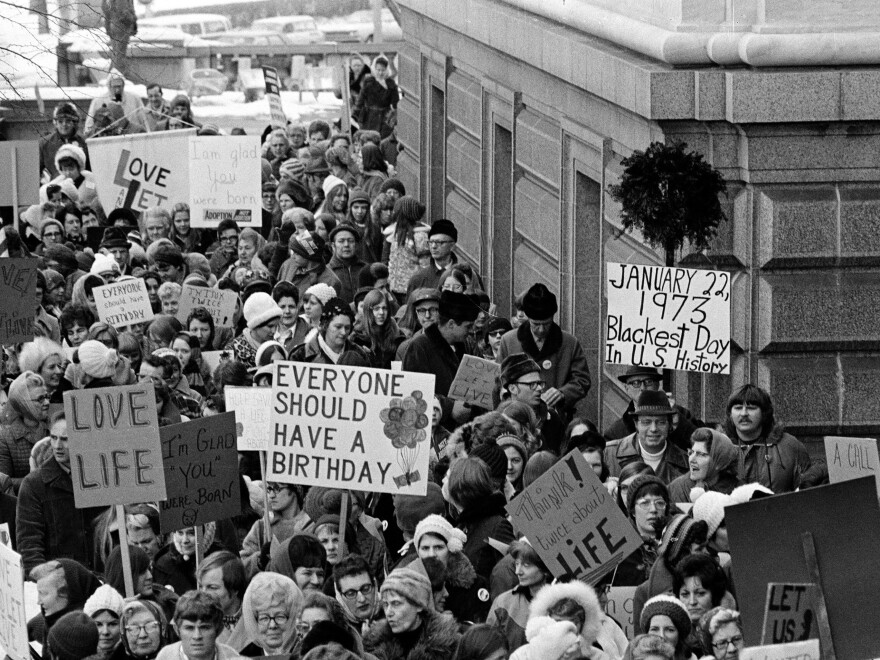
The news site Politico sent shockwaves across the country last night when it published what appears to be an initial draft majority opinion — written by Justice Samuel Alito and reportedly circulated inside the court — suggesting that the U.S. Supreme Court intends to strike down Roe v. Wade.
NPR has not independently verified the document, and it's not yet clear what resemblance it might bear to the court's final opinion, which is expected in the coming months. But NPR legal affairs correspondent Nina Totenberg told Morning Edition that "it really smells like, looks like and feels like the real thing."
Striking down Roe effectively would end federal protection for abortion rights, opening the door for states to ban or restrict access to the procedure. While such a ruling would have enormous consequences, legal experts and onlookers alike are also struck by how the draft opinion made its way into public view in the first place.
Leaks of any kind are rare at the Supreme Court, and Totenberg says there hasn't been such a massive breach in modern history. She called it a "bomb at the court" that undermines everything the body stands for internally and institutionally, including its members' trust in their law clerks and in each other.
"No fully-formed draft opinion has been leaked to the press or outside the court," Totenberg says. "Once or twice there may have been leaks that say how is something going to turn out, or after-the-fact that somebody may have changed his or her mind. But this is a full-flown, Pentagon Papers-type compromise of the court's work."
There were actually two Roe-related leaks
There have indeed been leaks at the court before, albeit of a different scale. One of them actually was about the case at the heart of today's conversation: In 1973, the original Roe decision was leaked to the press before the court had formally announced it.
Jonathan Peters, a media law professor at the University of Georgia, noted in a Twitter thread that there were actually two Roe-related leaks in the 1970s.
First, the Washington Post published a story about the court's internal deliberations, including a June 1972 memo from Justice William O. Douglas to his colleagues that was mysteriously leaked.
Seven months later, Time magazine published the final decision and vote details just hours before the court was due to announce it — the result of an early scoop and a delayed ruling.
A Supreme Court clerk named Larry Hammond told Time staff reporter David Beckwith, a law school acquaintance, that the Roe ruling was coming, according to lawyer and author James Robenalt, who detailed the incident in a Washington Post column yesterday.
Hammond gave Beckwith the information "on background," and it was only to be reported once the opinion came down from the court. But the ruling was slightly delayed, and that week's magazine ended up hitting newsstands a few hours too soon.

The "20-second rule" and a double-cross
Then-Chief Justice Warren Burger was reportedly furious about the leak, demanding a meeting with Time's editors to tell them off. He also sent a letter to the other justices demanding that the leaker be identified and punished, and threatened to subject law clerks to lie-detector tests if no one came forward, Robenalt said.
According to Peters, this was also the origin of Burger's "20-second rule," in which any law clerk caught talking to a reporter would be fired in under half a minute.
Hammond offered his resignation to his boss, Justice Lewis Powell. But Powell didn't accept it, and instead called Burger to tell him "that Hammond had been double-crossed," writes Robenalt, who interviewed Hammond for his 2015 book about the political and cultural events of January 1973.
Burger wasn't quick to forgive the magazine, but accepted Hammond's apology and let him stay on as Powell's clerk. He continued in that role for an additional term before leaving the court to join the Watergate Special Prosecution Force.
"The story of Hammond's close call became legend to other clerks on the court at the time and has been passed down as a cautionary tale over time," Robenalt added.
Five decades later, the court is once again grappling with an internal leak about an unreleased ruling on matters concerning reproductive rights.
Totenberg told Morning Edition that while such a leak is not a crime, she believes the court will try internally to figure out who was responsible, adding that "it's a career-ender for whoever did."
This story originally appeared in the Morning Edition live blog.







